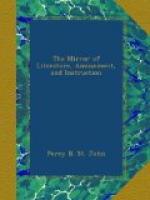The prospects of the colony are every day improving, to the satisfaction of all classes; and the great number of respectable settlers, and their patience and perseverance in establishing themselves, are the surest grounds for the ultimate prosperity of the settlement. The only objections, as I can see, that can be urged with any degree of plausibility against the success of the colony, are, that the land at Perth and in the neighbourhood is not of that description to induce the settlers to cultivate, and that all the good land being now granted, there is no more on this side the mountains to satisfy the demands of new settlers; but these objections are, I am happy to say, about to be removed, as an ensign of the 63rd regiment (a Mr. Dale) has lately returned from a tour of discovery into the interior, and has brought intelligence, that to the eastward of the Swan River there is a large and fertile tract of beautiful country, with a river passing through it, which, from a subsequent visit by Mr. Erskine, a lieutenant of the 63rd, is likely to prove of the greatest importance to the colony. Those of the settlers who have not taken up their grants of land mean to secure them here, and myself among the number, a grant having been allowed me, at the rate of 3,200 acres. The governor is quite delighted, and now considers the ultimate success of the colony to be certain. He intends visiting the country, and tracing the course of the river, in a few days; and it is my wish to accompany him, if possible, that I may select my own grant.
The spirit of detraction to which the writer alludes in the early part of his letter is thus noticed in the Cabinet Cyclopaedia, vol. iii. of Maritime and Inland Discovery: “The difficulties and embarrassments which the settlers at the Swan River have been obliged to endure, have been industriously exaggerated by the colonial press; the strong desire which exists in New South Wales to attract emigrants to that country being naturally allied with a disposition to disparage every other settlement.”
* * * * *
ON VIEWING CANTERBURY
From the rural Heights of Harbledown, in the Summer of 1827.
(For the Mirror.)
I.
I am no pilgrim unto Becket’s shrine,
To kneel with fervour on his
knee-worn grave,
And with my tears his sainted
ashes lave,
Yet feel devotion rise no less divine—
As rapt I gaze from Harbledown’s
decline
And view the rev’rend
temple where was shed
That pamper’d prelate’s
blood—his marble bed
Midst pillar’d pomp, where rainbow
windows shine;
Where bent the [1]anointed of a nation’s
throne
And brooked the lashes of
the church’s ire;
And where, as yesterday, with
soul of fire,
Transcendent Byron view’d the hallow’d
stone.
Sure Chaucer’s pilgrims, on this
crowning height,
Repress’d their mirth, and kindled
at the sight.




